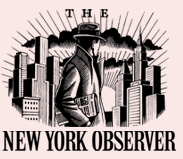Sound Familiar? NYO Apparently Looking To Ex-Employee For Inspiration
 Anyone who needs reminding of how jagged the ironies of cost-cutting can get ought to hotfoot it over to The New York Observer’s homepage. There, amid a quartet of articles centralized under the rubric “Today’s Top Stories,” you’ll find the wryly titled “My Town of Kind!” by Meredith Bryan.
Anyone who needs reminding of how jagged the ironies of cost-cutting can get ought to hotfoot it over to The New York Observer’s homepage. There, amid a quartet of articles centralized under the rubric “Today’s Top Stories,” you’ll find the wryly titled “My Town of Kind!” by Meredith Bryan.
Be warned: depending on the depth and genus of your news-addiction, “My Town of Kind” may also induce sensations in the realm of déjà vu.
Conceptually, “My Town” is a flashy number. It postulates, and then analyzes, an epidemic of politeness sweeping the nether regions of the web. Blogs, comment-boards, Twitter – until recently, these places were little more than steam-rooms for pissed-off subliterates. Now, Ms. Bryan observes, “wide swaths of the Web have become bastions of support and earnest civility.” So “My Town” has that in its favor already: a good idea. To boot, the author wields a brisk and able prose-style. Lightly jaded, unflaggingly urbane, her tone is pure Observer.
Yet “My Town” is also mortifying, in its way, and a sign of The NYO’s quickening decline.
Here’s why. Chronic readers of classy-glossy NYC weeklies may have noticed a piece in New York Magazine’s “Daily Intel” section last December. Its title was “The Warm-Fuzzy Web”, and it was written by Doree Shafrir, formerly of – wait for it – none other than The NY Observer. It’s about the epidemic of politeness sweeping the nether regions of the web . . .
To say the two pieces bear something of a resemblance to one another would be a little like saying Michael Haneke’s “Funny Games” (2007) bears something of a resemblance to Michael Haneke’s “Funny Games” (1997) – an understatement flirting with mental illness.
Aside from the basic sameness of their gist (and The NYO piece, damningly, neither nods nor links to its “Intel” precursor), the articles follow gravely parallel trajectories.
Both quote media consultants about how cynicism and sarcasm flop online. Both comment on the obsession, bred by social media, with hoarding friends and followers. Both note how this M.O. has superseded the anonymous shit-flinging of the Internet’s teen-years. Both express a certain nostalgia for these bygone anonymous shift-flingers. Both quote David Karp going on rather mind-numblingly about how well-behaved everybody is on Tumblr, which he founded. And both pause to note, catalogue-style, the ingenuity with which social media stymie the visitor who wishes to vent his displeasure. Here’s Shafrir:
On Facebook, we can only “like” things that people post; on Tumblr, there’s likewise only a “heart” button to indicate our approval. Twitter has a star. When people write things on Facebook or Tumblr or Twitter that we disagree with or simply find disagreeable, we can block them without their knowledge of our disapproval, and we never again have to see their posts about how much Going Rogue speaks to them.
And here’s Bryan:
To “like” someone’s post [on Tumblr] is to click on a heart-shaped symbol—an easy, “friction-less” gesture, [Karp] said—but there is no way to express the opposite if you find the post vaguely illiterate. (Similarly, on Facebook, there is no thumbs-down symbol.) There is however plenty to gain in terms of followers for your own blog if you opt to re-post people’s posts and add your own witty, positive commentary. Unlike many vicious Web commenters, users of these social-media platforms can be de-friended, unfollowed, ignored and potentially silenced by the platform itself.
This isn’t plagiarism, of course. What it is is evidence of an idea-drought compounded by a near-total evaporation of pride. Not a year after wrapping up one of the more sanguinary house-cleanings in recent memory (even the cleaning-lady got sacked), The NYO has been reduced to running slavish retreads of articles penned months earlier by writers they once employed. And not just that: The NYO is affording these retreads marquee placement on their website.
Even the steeliest connoisseur of comeuppance has to find this sadder than funny. From rags to riches, and back again, the bass-ackwards fairy-tale of a highbrow broadsheet . . .
New: The Mediaite One-Sheet "Newsletter of Newsletters"
Your daily summary and analysis of what the many, many media newsletters are saying and reporting. Subscribe now!






Comments
↓ Scroll down for comments ↓